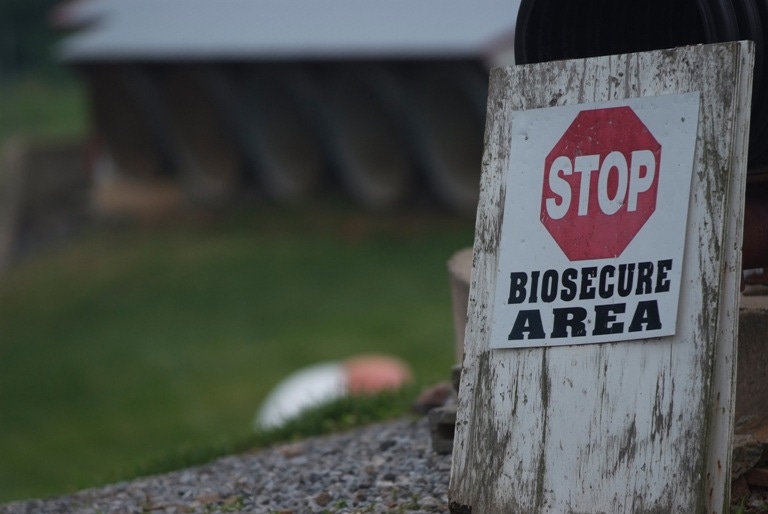ASF spread calls for stepped-up biosecurity
Pork producers would benefit from a review of farm biosecurity practices now to keep African swine fever and other diseases from spreading.
September 7, 2018

As the number of reported cases of Africa swine fever in China nears 20, U.S. pork producers should be taking notice.
The disease has appeared since August in several locations in China hundreds of miles apart, leaving researchers scratching their heads over how it spreads from one area to another, says University of Missouri Extension Veterinarian Corinne Bromfield.
This is the first time ASF has appeared in eastern Asia, raising concerns about the impact on the global pork industry. The United Nations called for an emergency meeting of animal experts Sept. 5 to halt the spread of the fatal disease.
Its devastating effects include high fever, anorexia, diarrhea, abortion, skin hemorrhages and death. Groups of pigs huddle and shiver together, breathe abnormally and cough. Pigs usually die within a week of infection. Call your veterinarian immediately if you see high morbidity or mortality, skin discoloration or other signs of the disease in your herd, says Bromfield.
ASF spreads quickly from pig to pig through direct secretions, on contaminated objects and through ticks. No vaccine exists to control the disease. Culling remains the only control option. Infection could occur during the shipping of meat from one area or country to another, says Bromfield.
ASF virus can contaminate pork products and remain in pork for a long time. It does not infect humans who eat the contaminated pork, Bromfield says.
“We do not have ASF in the United States at this time, but if it were to come here, rapid detection is our best chance for eradicating the disease,” Bromfield says.
Additional resources
• “Biosecurity for Today’s Swine Operation” (MU Extension guide)
• “Train employees, others before livestock disease outbreaks occur” (MU Extension news release)
Hog feed made with ingredients from outside of the United States could put U.S. hogs at risk, she says.
“ASF is considered a trade-limiting disease,” Bromfield says. “Most countries have regulations prohibiting or controlling live swine and pork product imports from other countries.”
MU Extension economist Scott Brown says the recent outbreak of ASF in China could have a huge impact on the pork industry at a time when hog prices are already low. It also could potentially raise prices for U.S. pork producers who could find new export markets. China produces and consumes half of the world’s pork, Brown says.
Bromfield says pork producers would benefit from a review of farm biosecurity practices now. She recommends that producers ask their feed suppliers about the origin of their feed and what biosecurity measures they employ.
The Iowa Department of Agriculture and Land Stewardship and the Iowa Pork Producers Association are encouraging pork producers to be on the lookout for clinical signs of the disease and to contact their veterinarian if they have herd health concerns.
“Unfortunately, we have seen a number of cases of African swine fever confirmed in China across a large geographic region. China has about 700 million pigs, or half the world’s swine population, so these discoveries are a serious concern,” says Mike Naig, Iowa Secretary of Agriculture. “While this virus poses no threat to human health or any food safety concern, it could have a devastating economic impact if it would be found in the U.S. Our pork producers do a great job with biosecurity and protecting pig health and the new cases highlight the importance of everyone remaining diligent in their biosecurity efforts.”
IDALS recommends the following
Farmers can take steps to protect their animals and prepare for a possible foreign animal disease event. Maintaining a high level of on-farm biosecurity is the best protection. Tips include:
• Ensure biosecurity plans are up-to-date and being implemented. This includes using a disinfectant specifically labeled for ASF.
• Proactively follow industry best management practices if hosting international visitors or traveling abroad. Click here for more information.
• Obtain or update premises identification number for each location where swine are located. Forms to complete or update premises registration information are available at by clicking here. If farmers have questions they can contact the Department’s Animal ID Coordinator toll free at 888-778-7675 or by email.
• Work with a veterinarian to use electronic certificates of veterinary inspection or Swine Production Health Plan herd agreements for all animal movements.
MU Extension swine veterinarians, engineers and economists are planning a set of biosecurity workshops in Missouri this winter. Click here for updates.
Sources: University of Missouri Extension News, Iowa Department of Agriculture and Land Stewardship
You May Also Like



